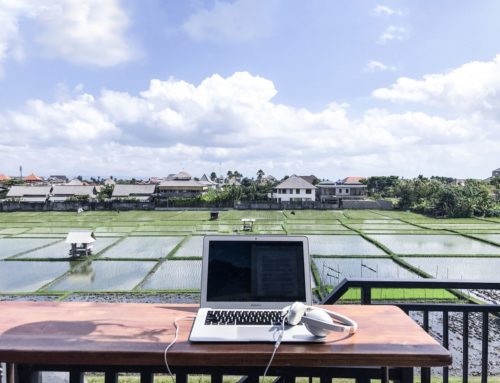We’ve heard, with growing vigour, the importance of having a robust mental health policy at work. The World Health Organisation (WHO) observes World Mental Health Day every October in an attempt to normalise how we talk about mental health and its effects in the workplace. And it’s not hard to understand why.
When we spend so much time at work, the experiences that we have in those eight hours – and often more – can affect our life outside of work. Our society and our lives are still driven by who we are as our work personas over who we are as people. Purpose-driven work is still a new and weird concept.
It is perhaps the greatest allure of a digital nomad lifestyle. Leaving behind the 9 to 5 for the idyllic, sun-drenched flexibility of remote work seems like the dream. And it’s becoming increasingly popular and legitimate with hundreds of people turning to remote work each year. Studies have shown us why remote work is a smart choice for both companies and workers alike. Reports show that remote workers are less stressed, more productive and even cost-saving.
I myself was one of the statistics, lured in by the ability to completely turn around my work-life balance and finally put my work first. More importantly, it allowed me to finally put myself first and commit to my mental health. It was the first time that I had given myself the time and space to take care of myself and rediscover my purpose.
Being a digital nomad is a huge uproot in lifestyle and the rules of work and life. If this seismic shift does not affect your mental health, you’d be superhuman.
Amongst all these benefits, it’s hard to remember that digital nomads can still have things to complain about. But it’s not so easy to just normalise a fully flexible lifestyle. Being a digital nomad is a huge uproot in lifestyle and the rules of work and life. If this seismic shift does not affect your mental health, you’d be superhuman.
With unlimited freedom, it can be intimidating to make the right choices. Without a regular routine, it can be difficult to ensure the healthy choices are prioritised and the temptation and FOMO of all the other things you could be doing overtake. Without the stability and process of a company, the stresses could actually be worse.
Palm trees and vacation vibes cannot be all that digital nomad means to you. It was the same attraction of unlimited vacations that many tech companies began to offer. It all sounds so great on paper – the ability to take as much time off as one needs. But the reality of unlimited vacations was they were only being offered by companies that were demanding and all-consuming. The high-pressure environment instead increased the guilt of anyone who dared use the policy.
In the same way, thinking that becoming a digital nomad will automatically get rid of all work-related stress fails to address the culture; the root cause of why this stress is there in the first place.
Sometimes, we can feel guilty for saying that this dream lifestyle is difficult and it can be difficult to ask for help when the times get tough. Just because the highs can be truly high, does not mean the lows don’t come along for the ride as well. We all need to take a moment to cry sometimes – and pick ourselves back up.
We are sold this idea that by finding work we love doing, it doesn’t become work anymore. What we forget that many of the same tenants of why our mental health is affected by our work conditions – the main one about how work and life seem to blend. Pursuing a passion project or building our own business can often aggravate this blend and it is difficult to draw the boundaries when we do find ourselves doing the things we love. Even in the highs of our business, our mind needs the time to rest and recover from all the work it took to get there.
For the same reasons that we should put in place a mental health policy in a workplace, we need to build a policy for ourselves.
And the first steps can start in the same example of WHO’s prescription to companies:
1. Analyse the issues
What are the things that cause you stress? Is it the clients you’re choosing? Is it your routine? Or maybe it’s your work environment.
Within the space you’ve created as a digital nomad, take the time to assess the factors that both help and hinder your work. We are used to the things that are prescribed to us – from the hours we work to the space we are given. Having the ability to change all that starts with understanding what it is that we want from these aspects and identifying how we can create a lifestyle that works.
2. Develop a policy
Now that you know what you need and want, how does that lifestyle actually look like? What is your new daily routine that ensures mindfulness is at its core?
Maybe it’s building a workout into your routine to ensure you are also thinking about your physical health. Or maybe it’s about setting boundaries with your clients including being clear about your scope of work and hours that you can be contacted. Particularly when digital nomads can work across timezones, we often forget about the times that we are entitled to turn off and be unreachable.
3. Develop strategies that can help
It may feel counterintuitive to reinstate a structure and work hours. But becoming a digital nomad is a transition and we cannot expect ourselves to catch up with the changes overnight. We’re looking at a lifestyle change; a culture change that puts mental health at the centre of it. Ensuring that this doesn’t become a nice thing to have but a real, actionable plan means building accountability into it. Maybe it’s about having a friend keep you accountable to your fitness plan. Or maybe you want to be setting clear goals and missions to keep you on track.
4. Implement and evaluate the policy
It’s all well and good to ensure that there is a strategy is in place but we all know that shit happens. Sometimes we get injured or we’ve arrived in a new city where all the yoga classes are taught in a foreign language and you’re not sure if you can justify the membership price to go. Or maybe there’s an interruption – like your mother coming to visit or you experience a setback in your business – and throws your whole world into disarray.
Remaining flexible and adaptable to the situation means you can pick yourself back up and get back on track. But even when things are going well, it’s important to take the chance to time out, evaluate and take note of how you’re doing. (And maybe scheduling a call with Marjolaine just might be the thing you need to just sort through all the life and evaluate how the policy is helping you reach your potential.)
Previously published on morningmarjolaine.com on July 16, 2018.
Photo by Finn on Unsplash



[…] dedicated ourselves to our mental health and self care, relearning how to balance work with life when life could no longer consist of […]